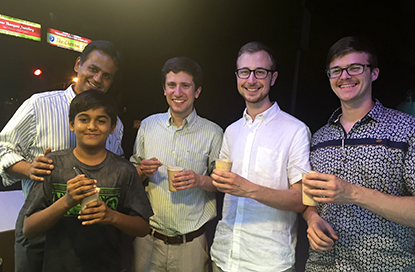Charlie Frank and Josiah Smiley, both now in their second year of medical school, each spent six weeks this summer at India’s Aravind Eye Care Center. Their research helped create a new survey tool so physicians can better understand the real-world implications of cataract surgery for patients.

“The hope is that, down the road, it will provide Aravind a better understanding of where to focus and allocate their resources to have the biggest impact,” said Frank. “They know the surgery restores vision but there’s been no great way to measure the real impact on people’s quality of life in a busy clinical setting.”
Under the guidance of Kellogg Eye Center Fellow Joshua Ehrlich, MD, MPH, the students developed a 12-question survey to be administered pre- and post-procedure. The questions emphasize the highly practical over the clinical. Do patients have trouble climbing stairs or recognizing faces? Do they avoid social functions because of their poor eyesight?
“It’s one thing for a doctor to ask you to read an eye chart, but people think in terms of road signs or newspapers,” Ehrlich said. “The idea is to measure outcomes that are more relevant to the patients in their everyday lives.”
The project was funded through the UMMS Student Biomedical Research Program. Frank and Smiley, both Global Health and Disparities Path students, piloted the survey to more than 200 patients slated for cataract surgery at Aravind, a hospital system renowned for its efficient, cost-effective approach to the procedure. Follow-up, post-surgery surveys were administered later by Aravind colleagues and results are expected in the coming months. In the meantime, the project has already been selected for a poster presentation at the upcoming Global Health Symposium at Detroit’s Henry Ford Hospital this month.
“I had done shadowing and some work overseas in clinics as an undergrad, but this was my first international research project,” said Smiley. “We had great mentors and we had an opportunity to work on this project with a meaningful real-world impact. I definitely think the summer will shape how I go into any future rotation.”
“That’s the true value of an international experience, regardless of what medical field the students opt to pursue down the road,” said Ehrlich.
“Whether or not they choose to become ophthalmologists, the most import thing is that they have this eye-opening cultural experience,” he said. “As a clinician in an increasingly diverse world, these experiences help you understand where your patients come from. And as possible future researchers, working in another country teaches you that things rarely happen exactly the way you expect them to. You have to approach problems with an open mind and expect the unexpected.”
